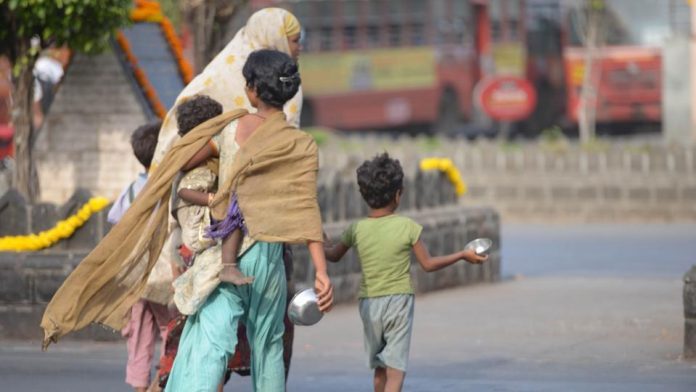Anti-begging laws in India: Is begging an offence?
Definition of begging as per anti-begging law:
Soliciting or receiving money or clothes or other things usually given to a beggar
- in a public place whether or not by singing, dancing, fortune telling, performing or offering any article for sale, or
- By entering on any private premises
- Exposing or exhibiting, with the object
- wound injury, deformity of diseases whether of a human being or animal
- Having no visible means of subsistence and wandering, about or remaining in any public place
- Allowing oneself to be used as an exhibit for the purpose.
Is Begging a crime in India?
Yes.
Punishment: imprisonment from 1 to 3 years.
Exception to Punishment: if the court is satisfied from the circumstances of the case that the person found to be a beggar is not likely to beg again, the court might release the beggar on his assurance of abstinence from begging and being of good behavior.
Grounds on which punishment is decided:
- Age and character of the beggar,
- The circumstances and conditions in which the beggar was living,
- Findings made by the Probation Officer
Laws concerning begging in India:
In India, there is no central law which penalises begging but 22 states and Union Territories have their own anti-begging laws. The Act which functions as the derivative figure for all the state anti-begging law is Bombay Prevention of Begging Act, 1959.
Anti-begging laws in different states of India:
States which have their own anti-begging laws are attached in Annex 1.
| 1. | Andhra Pradesh | The Andhra Pradesh Prevention of Beggary Act, 1977 |
| 2. | Assam | The Assam Prevention of Begging Act, 1964 |
| 3. | Bihar | The Bihar Prevention of Begging Act, 1951 |
| 4. | Chhattisgarh | Adopted the Madhya Pradesh Bikshavirty Nivaran Adhiniyam, 1973 |
| 5. | Goa | The Goa, Daman & Diu Prevention of Begging Act, 1972 |
| 6. | Gujarat | Adopted the Bombay Prevention of Begging Act, 1959 |
| 7. | Haryana | The Haryana Prevention of Begging Act, 1971 |
| 8. | Himachal Pradesh | The Himachal Pradesh Prevention of Begging Act, 1979 |
| 9. | Jammu & Kashmir | The J&K Prevention of Begging Act, 1960 |
| 10. | Jharkhand | Adopted the Bihar Prevention of Begging Act, 1951 |
| 11. | Karnataka | The Karnataka Prevention of Begging Act, 1975 |
| 12. | Kerala | The Madras Prevention of Begging Act, 1945, the Travancore Prevention of Begging Act, 1120 and the Cochin Vagrancy Act, 1120 are in force in different areas of the State. |
| 13. | Madhya Pradesh | The Madhya Pradesh Bikshavirty Nivaran Adhiniyam, 1973 |
| 14. | Maharashtra | The Bombay Prevention of Begging Act, 1959 |
| 15. | Punjab | The Punjab Prevention of Begging Act, 1971 |
| 16. | Sikkim | The Sikkim Prohibition of Beggary Act, 2004 |
| 17. | Tamil Nadu | The Madras Prevention of Begging Act, 1945 |
| 18. | Uttar Pradesh | The Uttar Pradesh Prohibition of Begging Act, 1972 |
| 19. | Uttarakhand | Adopted the Uttar Pradesh Prohibition of Begging Act, 1972 |
| 20. | West Bengal | The West Bengal Vagrancy Act, 1943 |
| 21. | Daman & Diu | The Goa, Daman & Diu Prevention of Begging Act, 1972 |
| 22. | Delhi | Adopted the Bombay Prevention of Begging Act, 1959 |
Power of the police to arrest beggars:
- An authorized Police officer has the power to arrest without a warrant any person who is found begging.
- If a person is found begging inside a private property, arrest can be made on a formal complaint by the owner of the property.
- After arresting, it is the duty of the Police officer to send the arrested beggar to court.
- A beggar arrested is required to be kept in a certified institution as prescribed by the state government.
- If the court finds that the person accused was not involved in begging activities he is to be released.
- If the court is convinced that the person accused was involved in begging, appropriate punishment will be given by the court.
Cases:
The People of the State of New York v. Eric Schrader
the validity of the ban on begging in the New York City Transit System came in question. Comparing the solicitation of funds by legitimate charities and begging by individuals in need, the Court observed that though begging was accepted as constitutionally protected speech, the law banning begging in the New York City transit system was upheld because it was found to be a reasonable safety precaution.
Perka v. The Queen
It was held that while in the case of exploitation and compulsion by the ring leaders of a ‘begging racket’, the “beggar” who begs under compulsion of fear for bodily harm from them would have the defense of duress, where the “beggar” takes to begging compelled by poverty and hunger, he would be entitled to invoke the defense of necessity.
Ram Lakhan v. State
The Delhi High Court moved away from the judicial practice of castigating begging and upheld its legitimacy through a comparative discourse on the common law doctrines of necessity and duress, as well as on the principles of equality and liberty embodied in the Constitution. One significant aspect of Ram Lakhan is that it addresses the issue of begging from the touchstone of Article 19(1)(a), read with Article 21 of the Constitution, and asserts that unreasonable prohibitions on begging are unconstitutional in that they invariably deprive beggars of two fundamental rights.





